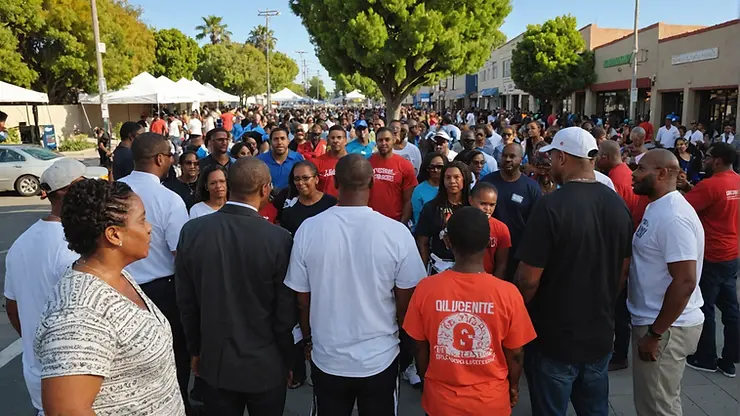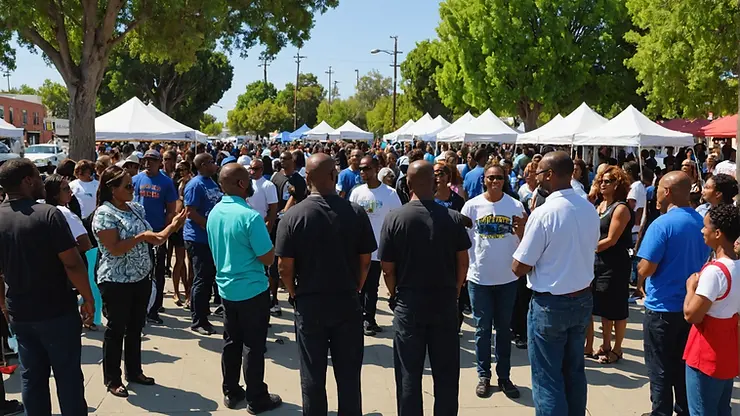In California, nonprofits aim to help the public, not make profits for owners. They must follow California laws and federal tax rules. They work for charitable, educational, scientific, or literary goals. Any extra money goes back into their mission.
The nonprofit scene in Los Angeles is diverse. Each type has its own rules and duties. Getting 501(c)(3) status in Los Angeles is key for tax breaks and donations.
Key Takeaways
- Nonprofits in California focus on public benefit over profit.
- Organizations must follow state and federal regulations.
- Types of nonprofits vary in structure and obligations.
- 501(c)(3) status is crucial for obtaining tax benefits.
- Surplus funds must be reinvested into the organization's mission.
Understanding California Nonprofits
In the nonprofit sector la, organizations tackle big social issues. California has many nonprofits los angeles that help different community needs. Sadly, almost one million Californians live in food deserts, with 45% being low-income. Nonprofits help by making sure everyone has access to what they need.
The ccscla nonprofit is a great example. It invests in places where people can buy fresh food, adding over 435,000 square feet of space. This effort has given over 800,000 people better food options and created more than 450 jobs. Amazingly, 62% of these jobs go to people from the local area, with 91% being low- to moderate-income.
We're not just about food. We also work to improve people's lives in other ways. For example, wages at these stores are higher than what other California grocers pay. Plus, these stores have seen wages grow faster than the state and national averages. Employees also get health and retirement benefits more often than the national average, helping them build a better future.
It's important to know how California nonprofits work and what rules they follow. Following these rules helps us stay true to our mission and succeed in helping our community.
Types of Nonprofits in California
California is home to many nonprofits, each with its own mission. Knowing about these types is key for those interested in the nonprofit world. The state recognizes three main types of nonprofits, important for anyone in the 501(c)(3) los angeles scene.
Public Benefit Corporations
Public Benefit Corporations aim to help the public. They work on causes like saving the environment, education, and health. For example, TreePeople in Los Angeles focuses on green living and community involvement.
Mutual Benefit Corporations
Mutual Benefit Corporations help their members, not the public. They might be trade groups, social clubs, or insurance companies. They offer support and benefits to their members, improving community life.
Religious Corporations
Religious Corporations serve spiritual needs. They include churches and synagogues, offering community service and outreach. These groups meet spiritual needs and help with social programs, building community.
Requirements for Starting a NonProfit in California
Starting a nonprofit in California requires several key steps. First, we need to create a clear mission statement. This statement outlines our purpose and goals. It guides our decisions and operations.
Next, forming a diverse board of directors is essential. A diverse board brings different perspectives, which is crucial for effective governance. After setting up our board, we must file the Articles of Incorporation. This document defines our purpose, structure, and tax compliance. Following laws is vital for nonprofits in Los Angeles.
We also need to create bylaws that outline our operations. These bylaws detail the roles of board members, meeting rules, and other important guidelines. A strategic plan is also crucial. It outlines our fundraising, community outreach, and local presence.
Operating in California means we must know local regulations for charities. This ensures we follow standards while serving our community. Organizations like Concerned Citizens of South Central Los Angeles show the impact of good planning and governance.
Key Legal Documents for California Nonprofits
Starting a ccscla nonprofit in California? Knowing the key legal documents is a must. These documents help you follow state laws and set up a strong base for your nonprofit in Los Angeles.
Articles of Incorporation
The Articles of Incorporation are the first step for any nonprofit. You file them with the California Secretary of State. They share important details about your organization.
This document includes your nonprofit's name, purpose, address, and initial board members. It's a crucial step to become a legal entity separate from your founders.
Bylaws
Bylaws are key to running your nonprofit smoothly. They outline how your organization will be managed. This includes rules for board meetings, voting, and membership.
Having clear bylaws is vital for keeping your nonprofit in order. It helps avoid conflicts among members. For ccscla nonprofits, good bylaws ensure you follow state laws and your mission.
What is a 501(c)(3) Status?
A 501(c)(3) status is key for nonprofits in Los Angeles. It means they don't have to pay taxes. This lets them get donations that people can write off on their taxes. This is a big help in getting money for their work.
To get this status, a group must meet strict rules. They must help others, not make money for themselves. They also have to follow rules about how they run things and report their actions. This keeps things honest and open for everyone.
Groups like the Concerned Citizens of South Central Los Angeles show how good this status is. They've been helping since 1985. They offer homes to 2,000 families and programs for 3,000 kids. They also clean up the area and help people find jobs.
We talk to our community a lot to know what they need. This helps us do our job better. Thanks to donors, we can keep helping people. Getting donations that people can write off is a big help.
Nonprofit Los Angeles: Regulations and Compliance
Working in the nonprofit sector in Los Angeles comes with its own set of challenges. Nonprofits here must follow both state and federal rules. This ensures they are transparent and accountable in their work. The California Attorney General’s office is key in checking if nonprofits register, report, and fundraise correctly.

Our nonprofits must file yearly reports and keep detailed financial records. Following fundraising rules is crucial. Breaking these rules can result in fines or even losing tax-exempt status. The California Franchise Tax Board makes sure nonprofits meet their financial duties, showing the need for careful money management.
For instance, efforts to fund new projects show the community's focus. Loans made to groups like Concerned Citizens of South Central Los Angeles help solve financial issues. They also support affordable housing. For more on these agreements, see the full memo here.
Dealing with these complex rules needs a strong commitment to following them. This commitment builds trust and support in the community. It lets nonprofit organizations in Los Angeles succeed and make a real difference.
Tax Exemptions and Benefits for Nonprofits
Tax exemptions are a big help for los angeles nonprofit groups. They let these organizations use more money for their missions. In California, these exemptions are key for groups helping the community and those in need.
Welfare Exemption Criteria
To get the welfare exemption, groups must show they help a lot of people. They need to help low-income families or improve community life. It's important for ccscla nonprofits to keep clear records of their work. This shows they meet the rules set by the government.
Property Tax Exemption Process
To get a property tax exemption, nonprofits must apply to the local tax office. They need to prove they are tax-exempt and explain why their properties qualify. A good application can save a lot of money over time. This lets nonprofits like the Coalition for Sustainable Initiatives spend more on their main work. For more details on this in Los Angeles, see the report here.
Importance of Nonprofit Governance and Board Structure
Good governance is key for any nonprofit in Los Angeles to succeed. We need strong structures that bring transparency, accountability, and planning. This ensures we can face challenges, grab opportunities, and achieve our goals for the community.
The Role of the Board of Directors
The Board of Directors is crucial for guiding nonprofits. It's made up of people with different skills and knowledge. They set policies, check finances, and watch over the leaders.
Good governance helps board members make smart choices for our stakeholders. A diverse, active, and involved board can help us fight for social justice and environmental fairness. This is especially important in areas hit hard by issues like those in Karen Brodkin's Power Politics.
Effective Governance Practices
Good governance practices are vital for nonprofits, especially in areas like environmental justice and community work. We should regularly check how our board is doing, have clear rules on conflicts of interest, and follow our bylaws. This keeps our organizations strong and focused on community needs.
By focusing on teamwork and building coalitions, we can make a bigger difference in Los Angeles. Strong governance makes us better at advocating for change in our communities.


